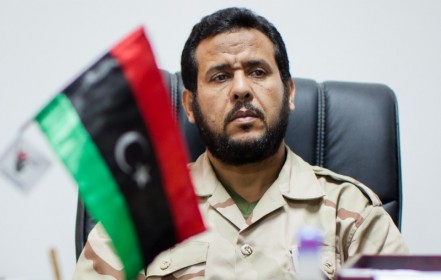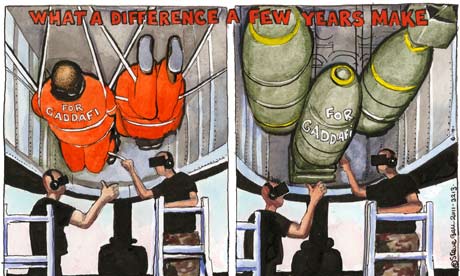Shocking but unfortunately unsurprising reports have emerged that American and British intelligence agencies were complicit in the torture and extraordinary rendition of Gaddafi regime “enemies”. At the same time, in an awkward development for the rebels’ ally NATO, a key rebel commander, Abdul Hakim Belhaj, is considering suing the US and the UK for their role in his torture and rendition.
The records were found by journalists in the office of Moussa Koussa, Gaddafi’s former intelligence chief. Following his defection to the UK early in the Libyan conflict many human rights groups had called for his arrest but he was able to find asylum in Qatar. Surely UK officials are now wishing Koussa had taken the documents with him!
The implications of these revelations on the situation in Libya are unclear. Clare Algar, at The Guardian, suggests that the UK’s “relations with anti-Gaddafi forces [have been] poisoned virtually before they could even begin.” The extent to which relations have been damaged will only be revealed in the coming weeks and months. These developments, however, are only more evidence of the complicity of key Western states in propping up the Gaddafi regime. They also provide credence to and fuel calls for accountability, not only of pro-Gaddafi and rebel forces but of external actors as well.

Abdul Hakim Belhaj, a key rebel commander, is now considering suing the UK and the US for the complicity in his rendition and torture (AFP/Getty Images)
Of course, some will note that Western intelligence agencies should have a had a relationship with the Gaddafi regime. They wouldn’t be wrong. It was neither absurd nor unwise that the US or the UK and their intelligence agencies had a relationship with Libya. The problem is one of distance; it is now clear that the relationship between these Western intelligence agencies and a Libyan regime which had recently sponsored terrorism was remarkably close. Consider the friendly, cozy language of one memo from Stephen Kappes, a senior official in the CIA, and Moussa Koussa, at the time Libya’s spy chief:
“We are eager to work with you in the questioning of the terrorist we recently rendered to your country.”
Further, apparently at least one British memo ends with the epithet “Your Friend”, while another, by senior intelligence official Mark Allen in response to the successful transfer of Belhaj from Malaysia to Libya, reads:
“This was the least we could do for you and for Libya to demonstrate the remarkable relationship we have built over recent years.”
Additionally, the most recent Libyan foreign minister admitted last night, on BBC, that British intelligence officials had continued their work through January and into February 2011 – right up to the beginning of Gaddafi’s crackdown.
Peter Bouckaert of Human Rights Watch described the extent of cooperation:
“It wasn’t just abducting suspected Islamic militants and handing them over to the Libyan intelligence. The CIA also sent the questions they wanted Libyan intelligence to ask and, from the files, it’s very clear they were present in some of the interrogations themselves.”
I have previously written about the remarkably close political, economic and military relationship between Western states and the Gaddafi regime. Many have been quick to say that any relationship between the West and the Gaddafi regime would have been wrong. This isn’t the case. Engagement between Western states and the Gaddafi regime was instrumental in guaranteeing that Libya discontinued its sponsorship of terrorism and its nuclear program. However, as Stephen Glover has rightly explained:
“What is not defensible is the subsequent indulging of this horrible man, and treating him as though he were a normal leader of a normal country.”
More broadly, The Guardian’s Editorial board presented the ever pressing challenge in dealing with autocratic regimes:
at the heart of this case lies a truth about the way democracies deal with dictatorships. The answer is: all too easily
What these damning documents demonstrate is that not only did the UK and the US treat Gaddafi and his regime as normal, but as partners in the war on terror and in the perpetration of torture – as obvious a crime against humanity as they come.
So how have the US and the UK responded?
A CIA spokesperson had this to say:
“It can’t come as a surprise that the Central Intelligence Agency works with foreign governments to help protect our country from terrorism and other deadly threats.”
Meanwhile, British PM David Cameron has asked for an existing commission, the Gibson Inquiry, which is examining claims of rendition and torture to examine these allegations as well. Foreign Secretary William Hague was sent to answer for MI5 and MI6. He chose to hide behind partisan politics, arguing that the allegations
“relate to a period under the previous government so I have no knowledge of those, of what was happening behind the scenes at that time”.
I suppose not knowing what happens before you’re elected is a good enough excuse for Hague and that “doing your homework” wasn’t a lesson he took into his political life.
The argument that key Western states view international accountability and justice as instruments to be used at their will is now all the more salient. More than ever, it appears that key Western states were more than happy to find a partner and ally in Gaddafi. With the advent of the Arab Spring and the Gaddafi regime’s brutality, these Western states succeeded in having the situation in Libya referred to the ICC, but with key provisions to shield them from scrutiny. Knowing the closeness of their relations with the Libyan regime, they then sought to shape the international intervention to protect themselves by guaranteeing that the ICC was only granted permission to investigate events after February 15 2011.
The temporal, jurisdictional limit which prevents the ICC from investigating events prior to February 15 2011 has had its intended effect: it has shaped a narrative of the Gaddafi regime as one defined by its brutal crackdown on protesters rising up for democracy and human rights. At most, the popular Gaddafi narrative is told as one where he sponsored terrorism, was responsible for Lockerbie, bombed a disco in Berlin, followed by a decade of silence and looking the other way on human rights abuses (if not praising human rights standards), and then, “out of nowhere” cracking down on his own people. These allegations expose those “lost years”. Yet, because the Court cannot or chose not to investigate any alleged crimes prior to February 15, Western states cannot be shown to be complicit in those crimes and thus bear some responsibility.
These reports of extraordinary renditions and torture may also now be the most blatant sullying of an intervention which, to date, had had been a remarkable success for the intervening forces in may ways: few civilian deaths, little collateral damage, not a single soldier on the ground (there were special forces, but not soldiers), and, most importantly, what appears inevitably to be a Gaddafi-free Libya, largely achieved with rebel forces in the drivers’ seat.
Of course, these documents are not yet verified as authentic, but it speaks volumes that few would be surprised. Further, it is disturbing that we would only know of these links between the CIA and MI5 and the Gaddafi regime because of the turmoil and instability wrought on by the conflict in Libya.
If the allegations turn out to be true, and the responses by both Foreign Secretary and the CIA suggest they are, it will be hard, if not impossible, to achieve complete justice in Libya. When the UN Security Council included the provision that no events prior to February 15 2011 could be investigated, the UK and the US betrayed the fact that they had unsavoury relations to hide. With allegations emerging that their intelligence services were complicit in torture and extraordinary rendition, surely, justice cannot be achieved if some British or American officials aren’t brought to account.





Very interesting article. Thanks for the information!
Pingback: The Death of Gaddafi and the “Injustice Cascade” « umuvugizi